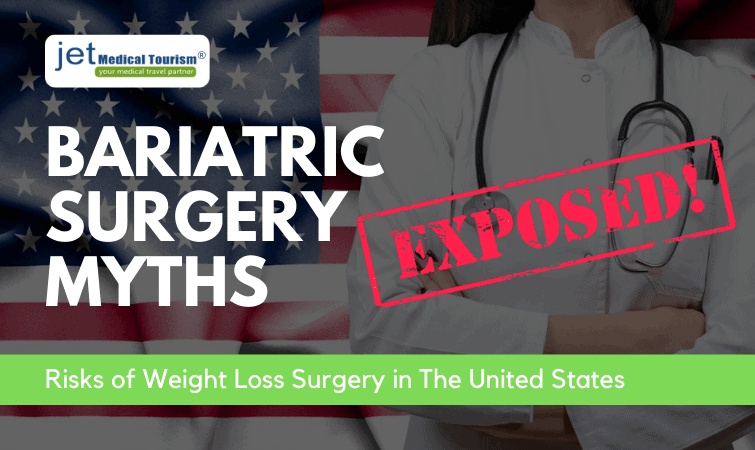Risks of Weight Loss Surgery in The United States: Bariatric Surgery Myths Exposed

Over the last few decades, the incidence of obesity in the United States has increased exponentially. According to a National Institutes of Health (NIH) report, bariatric surgery has emerged as the “most reliable” solution to achieve weight loss among people suffering from obesity.
At the same time, according to the report, weight loss surgery also has a “major impact” on obesity-related diseases. It goes on to say that morbidly obese people have an “increased survival” rate after bariatric surgery compared to those in the same circumstances who do not choose this surgery.
The benefits of weight loss surgery have resulted in a “dramatic increase” in the number of patients choosing this procedure in the US. From 10,000 surgeries in 1998, the number jumped to 220,000 in 2008. However, the report says that while the benefits of bariatric surgery are now “widely accepted,” candidates for this procedure are by definition at high risk.
The implication seems to be clear that a medical procedure involving high-risk patients is likely to have higher rates of complications. But the procedure itself cannot be blamed for it. (For example, in an advanced stage cancer surgery, the survival rate is likely to be lower. But that does not mean that the fault lies with the quality of the surgery or the operating surgeon’s skills.)
Death Rates in Bariatric Surgery in the US
Any major surgical procedure will involve some risk of complications. That is why you have to sign “consent forms” prior to the surgery. The same risks also apply to bariatric surgery. An article published by Vox.com says that while bariatric surgery is the best treatment available in medical science for weight loss, it fails to achieve the desired results in about one in 10 patients.
The Journal of the American Medical Association (JAMA) is probably the world’s most prestigious research publication in the field of medicine. JAMA released the results of an extensive research study conducted to determine the death rates in bariatric surgery. The study was carried out over a period of 10 years from 1995 to 2004.
The research report has been made available for free access to all (free PDF download) to educate people about the risks of weight loss surgery in the United States and elsewhere. The report says that bariatric surgery is the “most effective treatment” for patients suffering from obesity (BMI of 40 or above), and each year more bariatric procedures are being performed.
And yet, while weight loss surgery is “most effective” and the number of surgeries is increasing every year, JAMA study found that in its sample size of 16,683 bariatric surgeries, 440 deaths occurred. In other words, the death rate in weight loss surgery was 2.6%.
Another research study published by the NIH found that 18 deaths occurred within the first 30 days after bariatric surgery in 6,118 patients. The cause of one-third of the deaths (33%) was determined to be sepsis, which is a life threatening complication resulting from an infection. The study concluded that the 30-day mortality rate in weight loss surgery is confirmed to be “low”.
YOU MIGHT ALSO LIKE: Best weight loss surgery options
Weight Loss Surgery Myths, Lies and Misconceptions in the United States
Some vested interests in the United States have continued to propagate myths about bariatric surgery to misinform and mislead American patients who are suffering from the ill-effects of obesity. If one highlights only the 18 deaths (in the study cited above), one can create a fear in the minds of patients that bariatric surgery is risky.
Misusing a single data point without providing full and transparent information is the worst possible damage that some vested interests are doing to millions of American patients who struggle with obesity.
For example, some online articles criticize weight loss surgery medical tourism, but do not cite any research studies or medical evidence to back their claims. They only quote selective media reports to create a false image about bariatric surgery in Mexico.
These articles only provide anecdotal evidence about a few negative patient experiences, without counter-balancing it with thousands of positive life-enhancing patient experiences.
These types of motivated and misleading articles demonstrate an ugly truth. Some doctors in the US are charging exorbitant rates for bariatric surgery and they do not want American patients to benefit from equally safe but low cost weight loss surgery in Mexico.
As far as anecdotal evidence goes, there are numerous unsatisfied patients in the United States as well. So, does that mean that all bariatric surgeries in the United States are dangerous?
Many American patients may get the impression from such biased articles that bariatric surgeons in Mexico are not board certified or the hospitals are not accredited. However, this is far from the truth. Tijuana and other leading cities in Mexico have developed advanced infrastructure for weight loss surgery. Many doctors are board certified and many hospitals and bariatric centers have accreditation and/or certification from the government, while some hospitals even have JCI accreditation, which is the gold standard for hospitals in the US.
YOU MUST CHECK THIS: Choosing a bariatric surgeon in Tijuana – A step by step guide
Many bariatric surgeons in Mexico are highly qualified and have been board certified by the country’s medical boards. Clearly, if the patient experience in Mexico was less satisfactory compared to the US, the popularity of medical tourism to Mexico would not grow year after year. And vested interests in the US who charge exorbitant rates for bariatric surgery would not feel so threatened by low cost surgery options in Mexico.
CHECK THIS TOO: Weight loss surgery in Mexico how to choose the safest option
What does the ASMBS Say about Bariatric Surgery Medical Tourism?
The American Society of Metabolic and Bariatric Surgery (ASMBS) is the country’s most respected organization in this field to educate patients about weight loss surgery. The ASMBS cites data on its website saying that in 2007, three-quarters of a million Americans received medical treatments outside the country. More recent data shows an “exponential rise” in these figures, according to the ASMBS website.
The ASMBS goes on to address the critical issue of how the quality of bariatric surgery is monitored in medical tourism countries (where the US patients are seeking weight loss procedures). It says that various global organizations have responded to the growing demand for medical tourism. They have established “accreditation procedures” for the medical facilities in these countries.
READ THIS TOO: Medical tourism in Mexico grows: More Americans seek affordable healthcare
These organizations, which are providing international accreditation to medical tourism destinations, according to the ASMBS, include:
• The Joint Commission International (JCI)
• The International Bariatric Surgical Review Committee (IBSRC)
• Trent International Accreditation Scheme (UK)
• The International Organization for Standardization (ISO)
• The International Society for Quality in Healthcare
The ASMBS points out that the number of JCI accredited hospitals worldwide has increased by almost 1000 percent (10 times) within a span of five years.
“Establishing this high standard of accreditation instills a higher level of confidence in citizens seeking affordable health care alternatives abroad and many foreign hospitals seek this type of accreditation to attract American patients to their facility,” says ASMBS.
The ASMBS states its position clearly on bariatric surgery medical tourism by saying that it recognizes a patient’s right to choose medical care where they wish to. It provides several guidelines for American patients who want to undergo medical tourism weight loss surgery. One of the key guidelines says that patients should ensure that their surgeon is board certified (or board eligible) by a national board or credentialing agency.
In other words, the ASMBS does not insist on American board certification, and suggests that “national board” certification (or board eligibility) of the medical tourism host country is acceptable.
Final Word
In 2016, the US conducted the nation’s first-ever data analysis of medical malpractice cases involving weight loss surgeons. Members of the ASMBS task force were given access to data from 2010 to 2015 related to four of the country’s biggest medical malpractice insurance providers.
- The task force found that in 37% of the finalized cases during this period, the victims won a financial award ranging from $20,000 to $8 million (nearly $300,000 on average).
- In 27.5% of the cases, the defendant surgeon was a medical graduate from a foreign country.
- And merely 43% of the hospitals where the bariatric surgery was performed were accredited. The task force also determined that in 50% of the cases, the cause of complication was provider-related.
One can draw three simple conclusions from these figures:
1. Foreign medical graduates perform bariatric surgery in the US as well
2. Bariatric surgery is performed at non-accredited hospitals in the US as well
3. Surgeon-related errors and complications occur in the US as well
At the end of the day, surgeons are human beings, and hospital administrations are also run by human beings. Some margin of human error will always occur. But it’s vital to judge whether in a particular procedure the benefits significantly outweigh the limitations or not.
Bariatric surgery is saving millions of lives and improving the quality of life of millions more worldwide. Patients should be able to make an informed choice whether they want to receive their bariatric surgery in Mexico or the US or another destination. Each patient’s story is unique. Their health needs and their financial affordability are unique.
DON’T MISS THIS: Weight loss surgery in Mexico before and after stories
Thousands of Americans are undergoing affordable bariatric surgery every year in Mexico with outstanding results. It is important to focus on the brighter side of life, and make your decision with a positive mindset. Weight loss surgery is a transformative journey that can provide permanent freedom from obesity.
Be prepared to make an independent and rational decision about your medical tourism bariatric surgery in Mexico. Do not be misled or misguided by certain private medical or insurance providers with vested interests – who may be focusing on their own benefit, not yours.
References:
- https://www.ncbi.nlm.nih.gov/pmc/articles/PMC3249614/
- https://www.vox.com/science-and-health/2017/12/19/16742884/weight-loss-bariatric-surgery-pros-cons-stories
- https://jamanetwork.com/journals/jamasurgery/fullarticle/400707
- https://herviewfromhome.com/when-gastric-bypass-surgery-goes-horribly-wrong/
- https://www.mdedge.com/endocrinology/article/126740/bariatric-surgery/malpractice-issues-tied-bariatric-surgery-explored





